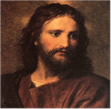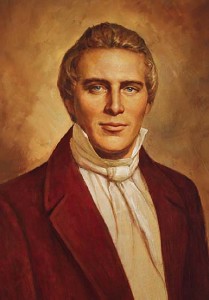|
||
Joseph SmithJoseph Smith, Jr. (1805-1844) was the founding prophet of The Church of Jesus Christ of Latter-day Saints (or Mormon Church). Members of the religion (Mormons) revere him as a prophet because, in accordance with the pattern set forth in the Old and New Testaments, he received great revelation from God to teach and lead his people, and did not rely on his own wisdom or learning. Mormons understand that whenever a prophet speaks, people would do well to listen to his counsels.
Joseph Smith’s ancestors were ordinary New England farm people who had emigrated from England to America in the 1600s and settled in Massachusetts. (It is interesting that he is a descendant of the Howland family tree, which is the same lineage as five U.S. presidents and British Prime Minister Winston Churchill.) Joseph was born to Joseph and Lucy Mack Smith on December 23, 1805, in Sharon, Vermont. In his youth Joseph was largely deprived of a formal education, but he was instructed in reading, writing, and the basics of arithmetic; his mother recorded that he was often given to meditation and deep study. The Smiths moved several times in under 20 years, but almost all of Joseph’s later childhood was spent near Palmyra, New York, in an area that was called the “burned-over district” for its fervent religious excitement, fueled by numerous Christian denominations. At the age of fourteen, Joseph was deeply perplexed about which church he should join, and the conflicting preaching of the various religious ministers increased his uncertainty. However, he was determined to know which of the many religions was right. After reading a passage in the Bible, instructing any who lacked wisdom to “ask of God” (James 1:5), Joseph decided to turn directly to the Lord for guidance. Early one morning in the spring of 1820, Joseph sought the seclusion of the forest to ask God which church he should follow. In answer to this prayer, as he recounted later, God the Father and Jesus Christ the Son appeared to him. This experience is called the First Vision in Mormonism and is considered a fundamental event in the history of mankind, second only to Christ’s death and resurrection. Joseph was told by his loving Heavenly Father and Savior that he should join none of the churches, for they had all gone astray. In fact, the First Vision was essentially God’s first step in restoring the true Church of Christ to the earth, lost for centuries. In 1823, after much patience and faith, Joseph Smith received a second heavenly visitation. An angel named Moroni appeared and told Joseph of an ancient record describing God’s dealings with former inhabitants of the American continent. This record was carefully hidden, buried in a nearby hillside, and although Joseph was led to the place the very next day, he underwent a new lengthy period of divine probation before he was granted actual possession of the sacred text. Obediently returning to the spot each year, Joseph received increasing instruction until finally, in 1827, he was given leave to remove and personally protect the record, inscribed, as it was, on gold plates. Shortly after obtaining the plates, Joseph Smith began translating the text into English by the “gift of God.” The result of his translation efforts became the Book of Mormon (later subtitled Another Testament of Jesus Christ, for it acts as a powerful companion to the Holy Bible). This new book of scripture was published in March of 1830; the following month, Joseph Smith officially organized the Church—the restored Church of Christ—and became its first president. While working in Harmony, Pennsylvania, in 1825, Joseph Smith met Emma Hale. On January 18, 1827, Joseph and Emma were married. Together they had eleven children, including two who were adopted; however, only five of them lived past infancy. Joseph deeply loved his family, and he filled his personal writings with accounts of his concerns and prayers for their welfare. During his brief life, the Prophet Joseph established cities, produced volumes of scripture, and dispatched missionaries to many parts of the world. He was involved in the construction of holy temples, served as mayor of Nauvoo, Illinois, and was even a candidate for the presidency of the United States. He was a controversial figure in American history who attracted persecution, because he challenged established creeds with his so-called Mormonism. On June 27, 1844, in a jail in Carthage, Illinois (enduring one of many wrongful imprisonments), Joseph Smith and his very supportive brother Hyrum were killed by a mob with blackened faces, martyred like so many prophets and faithful Christians in antiquity. Despite Joseph Smith’s death, The Church of Jesus Christ of Latter-day Saints (or Mormon Church) survived and thrived, for it is indeed established upon divine authority and eternal principles. God has proclaimed that this, His Church, shall not be taken again from the earth until the Second Coming of Christ. For more information visit the following sites: The Testimony of the Prophet Joseph Smith
|


